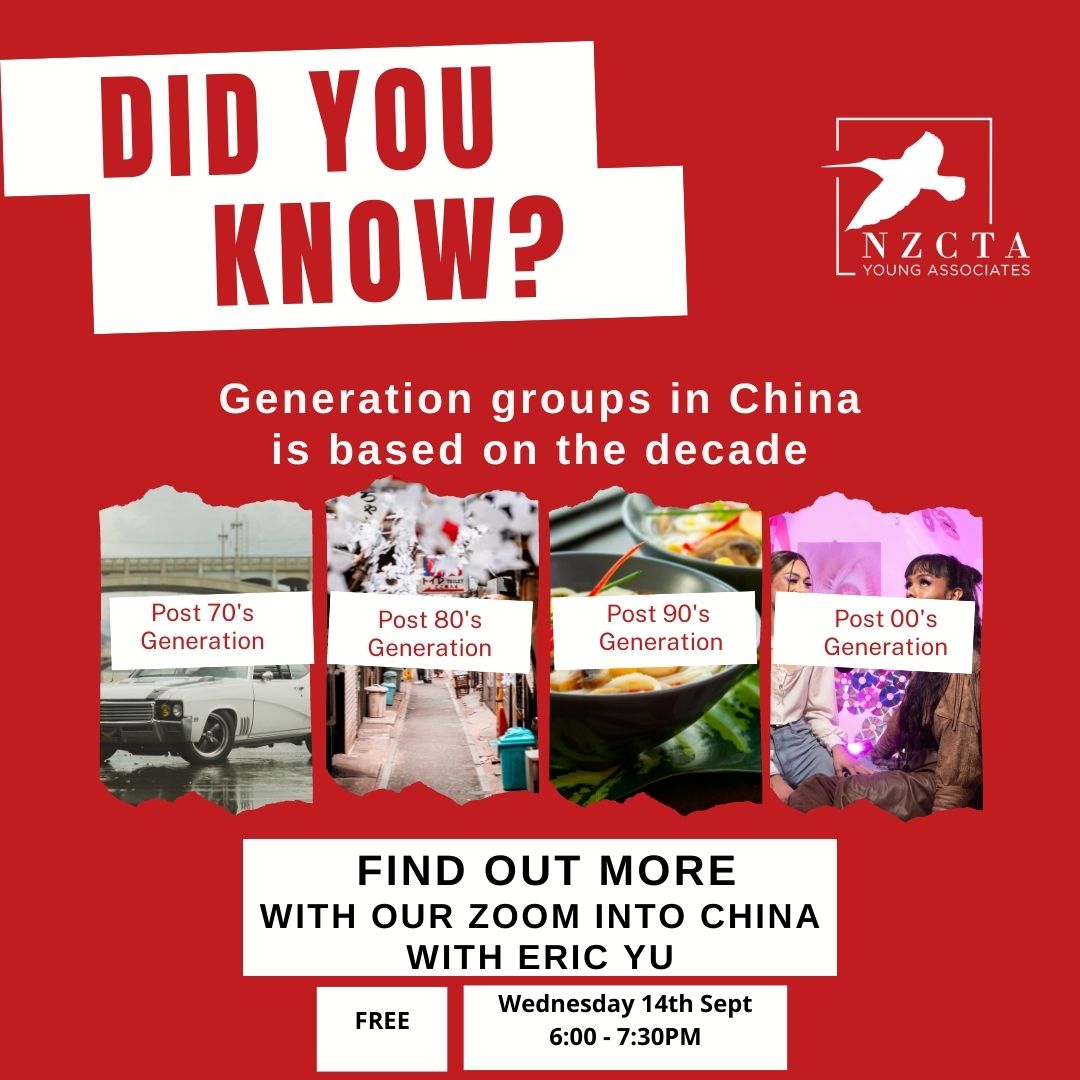Ecommerce & Trade in a covid age
Event review: Inter-generational changes and chances in China
China’s first digital natives are coming of age. With the split between generations becoming increasingly evident, digital marketer Eric Yu from United Media Solutions shared his views on how Generation Z, Millennials, and Baby Boomers have all been differently impacted through technology, brand consumption and ever-changing social environments. Eric discussed four key topics:
- What changes have been happening in China?
- Who is the new buying power in the Chinese market?
- Practical examples of what kind of strategies can be undertaken to target the rising buying powers in China.
- Using personal experience to draw insights into the differences between the younger generation in China versus younger generation New Zealadners, and how to adapt.
Delving into these topics, Eric broke down the biggest changes in the Chinese market over 2021. With Covid restrictions ongoing in China, naturally, this saw a large shift in the way Chinese consumers buy their goods, with a massive uptick in online shopping. Eric spoke to four key developments: convenience (such as same-day delivery, 7-day product return policies, and smart AI built to recommend products based on your interests); value deals (such as loyalty programmes and ability to price compare in online ‘malls’); safe shopping experiences through contactless delivery and secure storage boxes; and the numerous options available to Chinese consumers.
Moving on to his second topic, Eric broke down the new buying powers within the Chinese market by outlining various customer segments and drawing upon key differences that exist between each group. The consumer segments he spoke about alongside their characteristics are as follows:
Generation Z (Born 1996-2012 from Tier 1 & Tier 2 cities)
- High brand loyalty and consumption driven by community influencers, promotion intensity and loyalty programmes
- Love niche culture
- Strong self identity and say ‘no’ to what they dislike
- Swift shift in culture and trends
- Spend more time online compared to other groups
- Willing to share on socials
- Acquire information across various channels
- Spend money to please themselves and are willing to pay for what they like
- ‘Make more money, spend more money’ mindset
Xiao Zhen Qing Nian 小镇青年 (Born 1990-1999 from Tier 3 & Tier 4 cities
- A.K.A. ‘small town youngsters’
- Have a good education
- Come from cities with lower housing costs with better opportunities and emerging digital and lifestyle economy
- 52.6% annual spending growth in last 3yrs
- ‘I see it, I want it’ mentality – they purchase products in line with values and to express their personality
The ‘Silver Generation’ (Senior citizens 60+)
- Make up 17.4% of China’s total population
- Most have smartphones
- Average spending on F&B products is 3.6% higher than total average spending and travel expenditure is 3 times higher than that of millennials, owing to this group having time and money
After outlining these customer segments, Eric discussed ways in which businesses can best cut-through these groups using Chinese platforms. With over 800 million internet users in China, there are in excess of 100 million active users across various apps. One popular Chinese platform that most people have heard about, but may not be completely familiar with is WeChat, a free messaging and calling social app that has expanded to include pay and shopping functionality.
The average person spends 90 minutes per day on WeChat, and the platform offers better business communications, experiential customer services, seamless payment services, as well as rich social reach.
Drawing on his own WeChat use, Eric admitted he spends up to five hours per day on WeChat given the nature of his job. He uses the platform for work, social media interaction with friends, and makes use of its convenient payment services.
With its many active users, WeChat provides businesses with extremely rich data, including users’ location, what they buy, how much money is in their WeChat wallet, who they talk to, age group, and what articles they read. This amount of big data is invaluable to businesses to tap into and support marketing activities and brand loyalty due to the ability to really tap into what each segment seeks.
To end the webinar, there was a round of Q&A around the importance of customer segmentation and key values Chinese consumers care about most when making a purchasing decision, to which Eric answered loyalty programmes generally work well and are very common, however values are very age-dependent.
Event review written by Logan Emery on 26th September, 2022.

